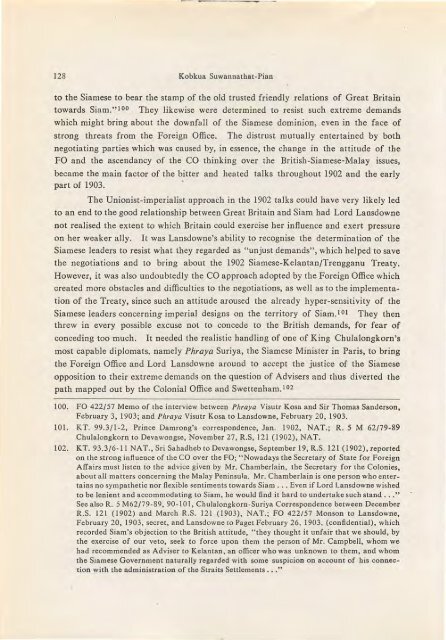The Journal of the Siam Society Vol. LXXII, Part 1-2, 1984 - Khamkoo
The Journal of the Siam Society Vol. LXXII, Part 1-2, 1984 - Khamkoo
The Journal of the Siam Society Vol. LXXII, Part 1-2, 1984 - Khamkoo
Create successful ePaper yourself
Turn your PDF publications into a flip-book with our unique Google optimized e-Paper software.
128 Kobkua Suwannathat-Pian<br />
to <strong>the</strong> <strong>Siam</strong>ese to bear <strong>the</strong> stamp <strong>of</strong> <strong>the</strong> old trusted friendly relations <strong>of</strong> Great Britain<br />
towards <strong>Siam</strong>." I 00 <strong>The</strong>y likewise were determined to resist such extreme demands<br />
which might bring about <strong>the</strong> downfall <strong>of</strong> <strong>the</strong> <strong>Siam</strong>ese dominion, even in <strong>the</strong> face <strong>of</strong><br />
strong threats from <strong>the</strong> Foreign Office.<br />
<strong>The</strong> distrust mutually entertained by both<br />
negotiating parties which was caused by, in essence, <strong>the</strong> change in <strong>the</strong> attitude <strong>of</strong> <strong>the</strong><br />
FO and <strong>the</strong> ascendancy <strong>of</strong> <strong>the</strong> CO thinking over <strong>the</strong> British-<strong>Siam</strong>ese-Malay issues,<br />
became <strong>the</strong> main factor <strong>of</strong> <strong>the</strong> bitter and heated talks throughout 1902 and <strong>the</strong> early<br />
part <strong>of</strong> 1903. ·<br />
<strong>The</strong> Unionist-imperialist approach in <strong>the</strong> 1902 talks could have very likely led<br />
to an end to <strong>the</strong> good relationship between Great Britain and <strong>Siam</strong> had Lord Lansdowne<br />
not realised <strong>the</strong> extent to which Britain could exercise her influence and exert pressure<br />
on her weaker ally. It was Lansdowne's ability to recognise <strong>the</strong> determination <strong>of</strong> <strong>the</strong><br />
<strong>Siam</strong>ese leaders to resist what <strong>the</strong>y regarded as "unjust demands", which helped to save<br />
<strong>the</strong> negotiations and to bring about <strong>the</strong> 1902 <strong>Siam</strong>ese-Kelantan/Trengganu Treaty.<br />
However, it was also undoubtedly <strong>the</strong> CO approach adopted by <strong>the</strong> Foreign Office which<br />
created more obstacles and difficulties to <strong>the</strong> negotiations, as well as to <strong>the</strong> implementation<br />
<strong>of</strong> <strong>the</strong> Treaty, since such an attitude aroused <strong>the</strong> already .hyper-sensitivity <strong>of</strong> <strong>the</strong><br />
<strong>Siam</strong>ese leaders concerning imperial designs on <strong>the</strong> territory <strong>of</strong> <strong>Siam</strong>. I 0 1 <strong>The</strong>y <strong>the</strong>n<br />
threw in every possible excuse not to concede to <strong>the</strong> British demands, for fear <strong>of</strong><br />
conceding too much.<br />
It needed <strong>the</strong> realistic handling <strong>of</strong> one <strong>of</strong> King Chulalongkorn's<br />
most capable diplomats, namely Phraya Suriya, <strong>the</strong> <strong>Siam</strong>ese Minister in Paris, to bring<br />
<strong>the</strong> Foreign Office and Lord Lansdowne around to accept <strong>the</strong> justice <strong>of</strong> <strong>the</strong> <strong>Siam</strong>ese<br />
opposition to <strong>the</strong>ir extreme demands on <strong>the</strong> question <strong>of</strong> Advisers and thus diverted <strong>the</strong><br />
path mapped out by <strong>the</strong> Colonial Office and Swettenham.l 02<br />
100. FO 422/57 Memo <strong>of</strong> <strong>the</strong> interview between Phraya Visutr Kosa and Sir Thomas Sanderson,<br />
February 3, 1903; and Phraya Visutr Kosa to Lansdowne, February 20, 1903.<br />
101. KT. 99.3/1-2, Prince Damrong's correspondence, Jan. 1902, NAT.; R. 5 M 62/79-89<br />
Chulalongkorn to Devawongse, November 27, R.S, 121 (I 902), NAT.<br />
102. K T. 93.3/6-1 I NAT., Sri Sahadheb to Devawongse, September 19, R.S. 121 (1902), reported<br />
on <strong>the</strong> strong influence <strong>of</strong> <strong>the</strong> CO over <strong>the</strong> FO; "Nowadays <strong>the</strong> Secretary <strong>of</strong> State for Foreign<br />
Affairs must Iiste.n to <strong>the</strong> advice given by Mr. Chamberlain. <strong>the</strong> Secretary for <strong>the</strong> Colonies,<br />
about all matters concerning <strong>the</strong> Malay Peninsula. Mr. Chamberlain is one person who entertains<br />
no sympa<strong>the</strong>tic nor flexible sentiments towards <strong>Siam</strong> . .. Even if Lord Lansdowne wished<br />
to be lenient and accommodating to <strong>Siam</strong>. he would find it hard to undertake such stand ... "<br />
See also R. 5 M62!79-89, 90-101, Chulalongkorn-Suriya Correspondence between December<br />
R.S. 121 (1902) and March R.S. 121 (1903), NAT.; FO 422/57 Monson to Lansdowne,<br />
February 20, 1903, secret, and Lansdowne to Paget February 26, 1903. (confidential), which<br />
recorded <strong>Siam</strong>'s objection to <strong>the</strong> British attitude, "<strong>the</strong>y thought it unfair that we should, by<br />
<strong>the</strong> exercise <strong>of</strong> our veto, seek to force upon <strong>the</strong>m <strong>the</strong> person <strong>of</strong> Mr. Campbell, whom we<br />
had recommended as Adviser to Kelantan, an <strong>of</strong>ficer who was unknown to <strong>the</strong>m, and whom<br />
<strong>the</strong> <strong>Siam</strong>ese Government naturally regarded with some suspicion on account <strong>of</strong> his connection<br />
with <strong>the</strong> administration <strong>of</strong> <strong>the</strong> Straits Settlements ... "

















